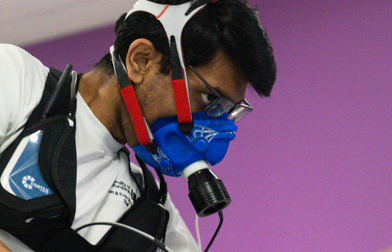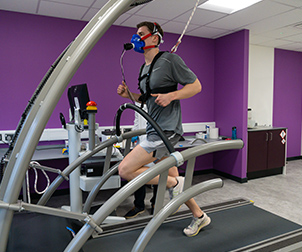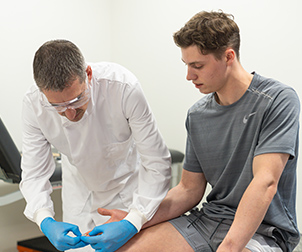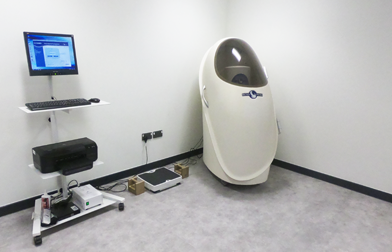Performance Testing Centre
Our team of qualified sport and exercise scientists offer a range of services designed to support your general health, training and performance demands at our BASES accredited state-of-the-art facilities. See below and/or contact us for further information about the tests or to book an appointment.
Our aim is to help optimise your health and performance through a range of tests to assess your fitness and health assessments
We can offer a bespoke package tailored to the exercising individual, the aspiring athlete and the complete sports team.
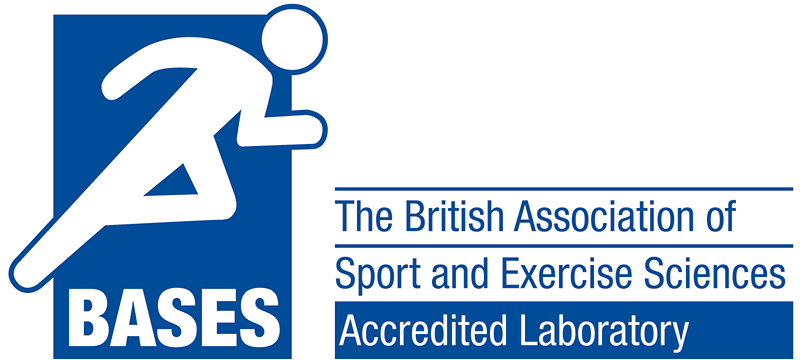
Physiological fitness and health assessments
We offer a range scientifically based, practical tests designed to assess cardiovascular fitness and markers of health and performance:
Test procedures involve a multistage graded exercise test (e.g. 1 min intervals) designed to achieve exhaustion. Oxygen consumption is monitored continuously throughout the test via a breath-by-breath gas analyser connected to a facemask. Heart rate is also monitored continuously throughout the test to elicit a maximum heart rate.
Your data will be presented in the form of a written report and will include oxygen consumption and respiratory exchange ratio (RER). All data will be explained fully within the report. The test can be performed on an ergometer of choice (e.g. exercise/road bike, treadmill or rower), dependent on the individual’s preference.
Test time approximately one hour.
NOTE: In some cases a sub-maximal test may be recommended over a maximal test. Data from the submaximal test can be extrapolated to provide an estimate of maximal oxygen consumption without emphasising the need for the individual to exercise until exhaustion. Submaximal testing may be of particular use for routine fitness monitoring, or for special populations with certain exercise contraindications (e.g. those with cardiovascular or respiratory implications). The test protocol involves an incremental exercise test to set criteria, performed on an ergometer of choice dependent on the individual’s preference.
Test time approximately one hour.
The lactate threshold requires you to exercise at increasing intensities for a few minutes, and after each stage a small sample capillary blood is taken from your fingertip to measure the concentration of lactate in blood. The intensity at which the concentration of lactate in blood starts to increase is known as the lactate threshold. This can be used to predict endurance performance, and also to personalise training sessions by determination of training zones.
The lactate threshold requires you to exercise at increasing intensities for a few minutes, and after each stage a small sample capillary blood is taken from your fingertip to measure the concentration of lactate in blood. The intensity at which the concentration of lactate in blood starts to increase is known as the lactate threshold. This can be used to predict endurance performance, and also to personalise training sessions by determination of training zones.
Our most comprehensive performance testing is completed over two laboratory visits, with at least one day of rest in between. In the first visit to the lab, you will perform a lactate profile, and one exhaustive tests until task failure at constant intensity. In the second visit, you will perform two subsequent constant intensity tests until task failure, interspersed by about 30-40 min of rest between. From the incremental test, you will get the lactate threshold. From the constant-intensity tests to exhaustion, we will construct the intensity-duration relationship, and calculate your critical speed (in running) or critical power (in cycling), as well as your V̇O2max.
i) Blood pressure measurement:
Systolic blood pressure, diastolic blood pressure and pulse rate can be assessed via an automatic blood pressure monitor (British Hypertensive Society approved). This is a quick process and measurements are typically provided within 30 seconds of the reading. Your results will be compared to recommended values.
ii) Haematocrit, Haemoglobin and Glucose:
Haemoglobin (Hb) is the iron-containing protein in red blood cells that increases the blood’s oxygen-carrying capacity. Haematocrit (Ht) is the ratio of red blood cells to total blood volume. From a health and performance point of views, Hb and Ht levels should be within the recommended range. The measurement of Hb and Ht can be used as an early warning of iron deficiency / anemia (when the reading is lower than the norm). Your results will be compared to recommended values.
The glucose reading will tell us the concentration of sugar in your blood. A too high level of glucose (hyperglycemia) is likely to be caused by diabetes mellitus. Hyperglycemia also causes a decrease in cognitive performance.
iii) Body composition assessment:
Body composition is estimated via Bioelectrical impedance analysis:
During this test, body composition (fat mass, fat free mass, estimated muscle mass) is assessed via the method of bioelectrical impedance, where very small electrical signals are passed through the body from four metal electrodes in contact with the hands and feet. This is a quick, pain free process and measurements are typically provided within 30 seconds of the reading. Your results will be compared to recommended values.
Following the above assessments, feedback and advice will be provided and a detailed report will be send by e-mail.
A Bod Pod is used to estimate body composition. The Bod-Pod uses Air-Displacement Plethysmography technique and is one of the gold standard techniques to quantify precisely body fat and fat free masses. Height, weight and body composition are measured to allow comparison with sport-specific and/or healthy ranges. The results will be compared to reference values and advice will be given accordingly.
The environment chamber at the Institute of Sport can be used to create temperatures between 10 and 40°C as well as manipulating the humidity. In addition, it can be used to simulate altitude of up to 5500m. Therefore, if you need to train for an ultra-endurance event in the heat, this gives you access to the chamber for up to 4 hours (4 x 1hr or equivalent). Also, if you are training for an event such as a trek to Everest base camp you can do altitude training prior to going.
As above, however this is a 6-hour package.
The environment chamber at the Institute of Sport can be used to create temperatures between 10 and 40°C as well as manipulating the humidity. In addition, it can be used to simulate altitude of up to 5500m. Therefore, if you need to train for an ultra-endurance event in the heat, this gives you access to the chamber for up to 6 hours (6 x 1hr or equivalent). Also, if you are training for an event such as a trek to Everest base camp you can do altitude training prior to going.
What can you expect from your appointment?
Prior to your appointment you may be asked some questions regarding your current training and health status. This is so we can confirm the test you have chosen is both suitable and safe for you to complete. You will also be given full test details and any specific requirements to follow (e.g. refrain from high intensity exercise 48 hours prior to your appointment).
On arrival you will be met by the sport and exercise scientist who will talk you through the testing protocol and answer any questions you may have.
Following the test your results will be transcribed into a written report. Depending on your choice of test you may be able to discuss your results immediately with the sport and exercise scientist. For the more complex tests, the report will be emailed to you with a full explanation of results. If you have any questions about your results or require further explanation, this is available on request.
Whether you are an athlete, exercising individual or a coach, our recommendations are designed to support your overall training, performance and health goals. Follow-up sessions are highly recommended to monitor your progress.
Team testing
We also provide fitness testing for teams/clubs (e.g. pre-season testing). Tests may include laboratory based testing or field based testing. Prices for team testing can be discussed on an individual basis depending on your requirements.
Please note, we are not able to take any further booking for now. Please check again at a later time to make your booking.
Contact us
Please email performancecentre@herts.ac.uk for further details.

